 Petzlover
Petzlover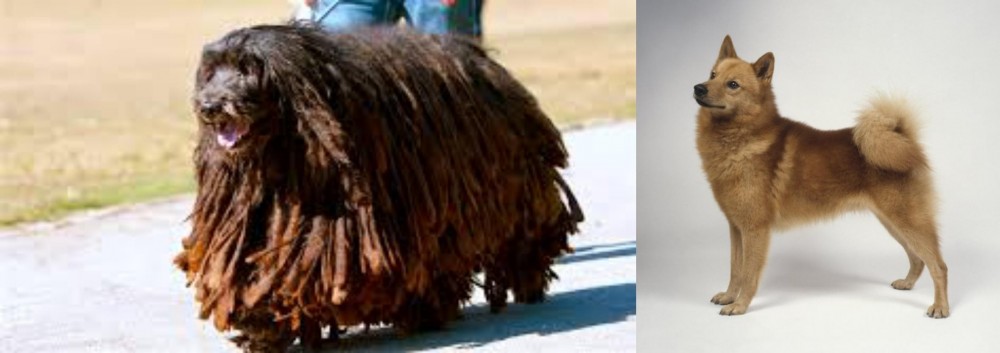 Bergamasco is originated from Italy but Finnish Spitz is originated from Finland. Bergamasco may grow 12 cm / 5 inches higher than Finnish Spitz. Bergamasco may weigh 23 kg / 51 pounds more than Finnish Spitz. Bergamasco may live 4 years more than Finnish Spitz. Bergamasco may have more litter size than Finnish Spitz. Both Bergamasco and Finnish Spitz requires Moderate Maintenance.
Bergamasco is originated from Italy but Finnish Spitz is originated from Finland. Bergamasco may grow 12 cm / 5 inches higher than Finnish Spitz. Bergamasco may weigh 23 kg / 51 pounds more than Finnish Spitz. Bergamasco may live 4 years more than Finnish Spitz. Bergamasco may have more litter size than Finnish Spitz. Both Bergamasco and Finnish Spitz requires Moderate Maintenance.
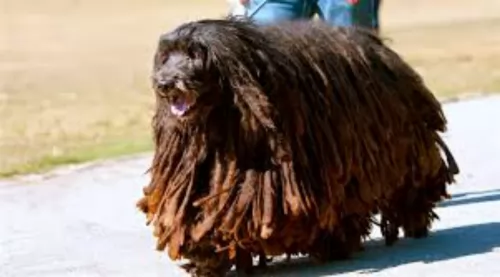 The Bergamasco comes from northern Italy. This medium sized sheepdog is of ancient origin. Known as an Italian sheep herding breed, his name actually comes from the town where he comes from - Bergamo.
The Bergamasco comes from northern Italy. This medium sized sheepdog is of ancient origin. Known as an Italian sheep herding breed, his name actually comes from the town where he comes from - Bergamo.
It was after World War II that there was danger that this breed would disappear as the need for herding and shepherding was diminishing. An Italian breeder, however, Dr. Maria Andreoli, stepped in to save the breed.
It was in 2015 that the American Kennel Club also changed the breed’s status from Miscellaneous to the Herding Group.
 The “barking Bird Dog” or Finnish Spitz was Developed in Finland. The breed is fearless and small with a different style than many other hunting dogs. He style of tracking is unusual and he indicated his quarry by barking. He was bred to hunt all sizes of prey from as large as bears to as small as squirrels. He was called the “Barking Bird Dig” because he pointed at the prey by barking and giving the hunter knowledge of the prey and an easy approach to it. In Finland, the Spitz is still a hunting dog. In 1979 The Finnish Spitz became the national dog of Finland.
The “barking Bird Dog” or Finnish Spitz was Developed in Finland. The breed is fearless and small with a different style than many other hunting dogs. He style of tracking is unusual and he indicated his quarry by barking. He was bred to hunt all sizes of prey from as large as bears to as small as squirrels. He was called the “Barking Bird Dig” because he pointed at the prey by barking and giving the hunter knowledge of the prey and an easy approach to it. In Finland, the Spitz is still a hunting dog. In 1979 The Finnish Spitz became the national dog of Finland.
Spitz-like dogs have been present in Finland for over 8000 years. It is believed that dogs living in higher latitudes had more in common with the Taymyr Wolf od North Asia than with the gray wolf. Tests indicate that the chance of the Spitz being related to the Taymyr is between 1.4&a and 27.3%. The Taymyr is extinct today. This shows that the present day dog descends from more than one type of wolf and more than one area. The Spitz was a favorite of the Finno-Ugrian tribes as he helped them find food. These tribes were pretty isolated until 1880. Then the Spitz were mated with other dogs and were almost extinct as a breed separate from all the other local dogs.
However, like many other breeds the Finnish Spitz found a savior. A Finnish huntsman, named Hugo Roos, noticed the native Finnish Spitz while he was hunting up North. He decided to breed dogs that were genuine Finnish Spitz without the blood of other breeds mixed in. After thirty years the current day Finnish Spitz was born.The latest breed standard was confirmed by the Love Finnish Kennel Club in 1996.
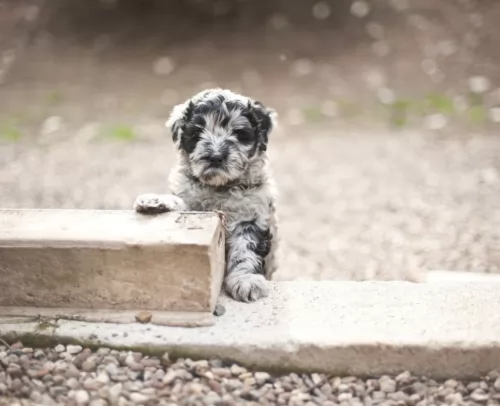 This medium sized sheepdog stands 54 – 62cm in height and weighs up to 38 kg as an adult. It is his coat which draws the most attention. It is of a coarse texture and actually greasy to the touch. It actually forms into strands or almost like dreadlocks from the top of the body, so that people agree he is one of shaggiest dog breeds there are.
This medium sized sheepdog stands 54 – 62cm in height and weighs up to 38 kg as an adult. It is his coat which draws the most attention. It is of a coarse texture and actually greasy to the touch. It actually forms into strands or almost like dreadlocks from the top of the body, so that people agree he is one of shaggiest dog breeds there are.
From age 1 on the coat starts to become woolly, and then the flocks start to form. As these clumps of hair appear, it will become necessary to separate them into smaller cords by hand to ensure attractive formation Brushing isn’t necessary but a big toothed comb can keep their hair ‘groomed’.
The colour of the coat is solid grey with patches of shades of grey and sometimes black. His dense, heavy coat makes it that he is suited to cooler climates. Because he is a herding dog, he wouldn’t do well in an apartment but would suit a home with a large garden.
He is intelligent and social but will need firm handling as he is a boisterous dog. He has a muscular yet compact body with a large head, long tail, high-set semi-drooping ears and large, gentle looking brown eyes. Although not instinctively aggressive, he makes an excellent watch dog with strong protective instincts to protect his human family.
He views new people into his circle with suspicion and wariness. He is good with kids and pets in the home and is playful and energetic.
 The Finnish Spitz is balanced and symmetrical in body and females are longer than males. They have a very distinguishable prick, foxy ears and face. They have a smiling expression and a curved tail. They are a golden-red color with a double coat. The under coat is dense and soft While the top coat is stiff. Puppies often look like little red fox cubs. When born they are black, grey or brown with a lot of black. As an adult the pups grow up to be a mix of fawn and dark black. Lips, nose and rims of the eyes should be black.
The Finnish Spitz is balanced and symmetrical in body and females are longer than males. They have a very distinguishable prick, foxy ears and face. They have a smiling expression and a curved tail. They are a golden-red color with a double coat. The under coat is dense and soft While the top coat is stiff. Puppies often look like little red fox cubs. When born they are black, grey or brown with a lot of black. As an adult the pups grow up to be a mix of fawn and dark black. Lips, nose and rims of the eyes should be black.
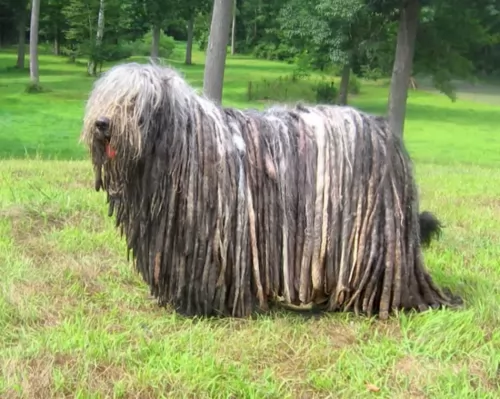 This is a working dog so they are naturally alert. He is also intelligent and independent and this independence is seen with training as he doesn’t take easily to following instructions, becoming stubborn. You’ll certainly want to have your Bergamasco socialized and trained as he can be a boisterous dog, bounding with energy.
This is a working dog so they are naturally alert. He is also intelligent and independent and this independence is seen with training as he doesn’t take easily to following instructions, becoming stubborn. You’ll certainly want to have your Bergamasco socialized and trained as he can be a boisterous dog, bounding with energy.
This is a dog that will need to be kept busy and provided with plenty of activities so that he remains happy, playful and relaxed.
Lively and intelligent, these dogs also form strong bonds with their owners and get on well with the children in the home. He will take well to country life as opposed to living in the city.
 Very child friendly – loves to play with children as long as the children pay attention to them. If not, the Spitz will go elsewhere.
Very child friendly – loves to play with children as long as the children pay attention to them. If not, the Spitz will go elsewhere.
They are independent thinkers and close to family but not strangers. They often “yodel” instead of howl.
Needs to be with people, bonds deeply with his humans. Most get along well with other dogs but because of their hunting instinct they are not good with small pets or birds.
They are smart and learn easily. They are great athletes and learn games and competition well.
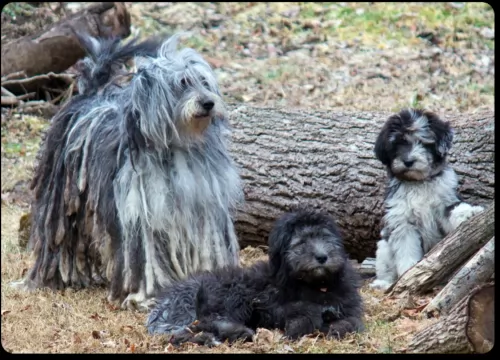 Your Bergamasco can live to be 13 to 15 years of age and he is considered to be a healthy breed. Nonetheless you want to be aware of health issues that are common to this breed
Your Bergamasco can live to be 13 to 15 years of age and he is considered to be a healthy breed. Nonetheless you want to be aware of health issues that are common to this breed
he is vulnerable to heat. He can die of heat exhaustion quicker than other breeds
keep an eye on him for hip dysplasia, progressive retinal atrophy and skin allergies
 Typically, a somewhat healthy breed, the Finnish Spitz does struggle with a few genetic concerns. They have been known to suffer from:
Typically, a somewhat healthy breed, the Finnish Spitz does struggle with a few genetic concerns. They have been known to suffer from:
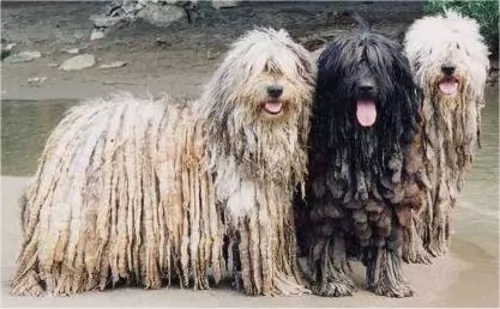 The Bergamasco isn’t a shedder but his coat will need to be combed once a week just to keep it in order. You don’t want to bath him too often, especially during the Winter as his coat takes a long time to dry. It isn’t recommended to shave a Bergamasco as the coat regulates the dogs temperature – keeping him warm and cold as the weather demands.
The Bergamasco isn’t a shedder but his coat will need to be combed once a week just to keep it in order. You don’t want to bath him too often, especially during the Winter as his coat takes a long time to dry. It isn’t recommended to shave a Bergamasco as the coat regulates the dogs temperature – keeping him warm and cold as the weather demands.
They thrive on a blend of kibble (dry) mixed with raw and-or moist food once or twice a day. Remember to include quality chicken, turkey, etc. mixed with some vegetables and rice into your dog’s diet. Ensure a constant supply of fresh water in an easily-cleanable bowl.
Balls and ropes are important for building muscle strength and burning energy. Remember your Bergamasco is a working breed and will need plenty of games and exercise.
 Don’t overfeed the little guy. The Spitz had a good appetite for a dog its size and can gain weight quickly . Feed twice a day about 1/8th of a cup.
Don’t overfeed the little guy. The Spitz had a good appetite for a dog its size and can gain weight quickly . Feed twice a day about 1/8th of a cup.
The same advice hold for the adult dog. Feed 1/4th of a cub of high quality dry food twice a day.
When the Spitz is a puppy you should limit strenuous exercise and jumping. Don’t spay neuter at too young an age. Wait until they are mature at 3-5 years of age.
Again do not exercise vigorously at too young an age. When older the Finnish Spitz will need a yard to run in and exercise to satisfy his hunting instincts. A long walk every day is a must.